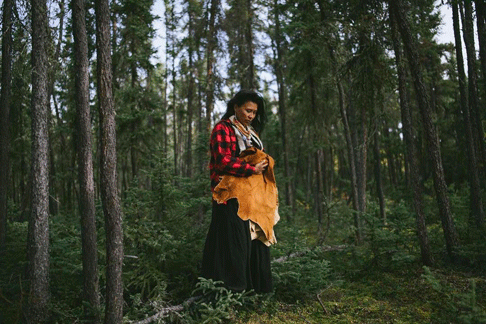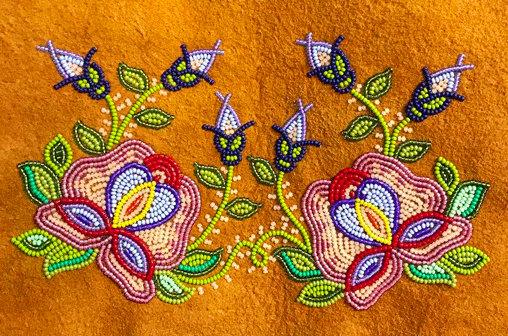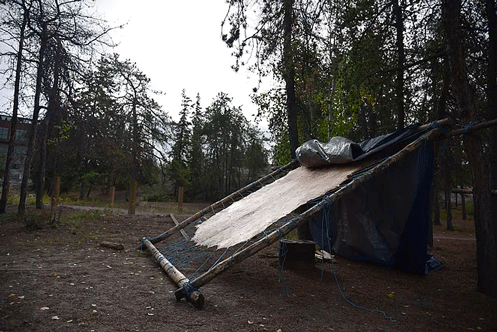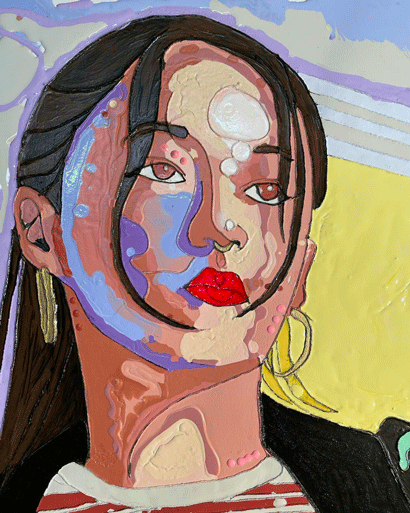Artist, actress, mother, and hide tanner, Melaw Nakehk’o is a conduit to the past, using her art to connect her community to the rich cultural heritage handed down by her ancestors. Nakehk’o is Dene and hails from Łı́ı́dlı̨ı̨ Kų́ę́ (Fort Simpson, Northwest Territories). According to her blog, she was taught to bead and sew by her “Granny,” and now works with the elders in her community to pass on knowledge and stories to the next generation through an organization she co-founded, called Dene Nahjo.

As Health Nexus explains, “The loss of traditional values, language, family and community kinship due to colonization, residential schools and other historical events has seriously affected the physical, emotional, mental and spiritual health of Aboriginal people in Canada.” Through her inspiring work, Nakehk’o is helping to heal her community and create better outcomes for her people, exemplifying the goals set out by the United Nations Sustainable Development Goal on Reduced Inequalities (SDG 10) and Sustainable Cities and Communities (SDG 11).
Due to the consequences of colonialism, Indigenous peoples of Canada face unique difficulties that result in high levels of poverty, abuse and chronic disease. As communities are subjected to unsafe drinking water, underemployment and violence, Health Nexus notes, “Healing is supported by Elders who pass on their knowledge and wisdom to keep their culture and traditional healing methods alive.”

Nakehk'o creates traditional Dene arts and crafts that hold a deep connection to her ancestors. On her blog, she describes how using traditional Dene materials was what fed her desire to learn how to tan her own moose hides to use in her work. In a recent interview with The Artivists’ Room podcast, she discusses how colonialism didn’t impact communities in the northwest of Canada quite as much as it did other regions of Canada. As a result, more knowledge about traditional ways of life were retained. Nakehk’o sought out Elders in her own and neighbouring communities to learn how to tan moose hide and has since acquired an abundance of knowledge to pass onto others.
Through her organization, Dene Nahjo, Nakehk’o helps facilitate two-week-long camps, where attendees learn how to tan their own hides. Through this supportive and educational environment, thousands of people have learned skills that had nearly been forgotten. The focus of Dene Nahjo is to build stronger communities, bolster a sense of cultural identity, and help participants become more politically-minded. Community engagement is essential to protect Indigenous populations and to help them thrive.

In the podcast, Nakehk’o says that her work with Dene Nahjo has been disrupted by the pandemic. In the meantime, she’s been completing a degree in visual art and has been busy creating paintings of Indigenous youth. She explains the importance of capturing impressions of modern, young, Indigenous people to affirm that they are not relics of the past, rather, they are an alive and thriving population. In fact, Indigenous people are both the fastest growing and youngest population in Canada, according to the 2016 Census.

In addition to tanning hides and visual artistry, she is also known for her small but powerful role as Powaga, a kidnapped Arikara woman in the film The Revenant. She continued her involvement in film with the release of a 2020 documentary K’i Tah Among the Birch, which details the time she and her family spent at a remote camp during the early days of the pandemic.
By tanning hides and creating her inspiring art, Nakehk’o is passing down sacred knowledge, ensuring cultural continuity and guiding her community toward a bold and thriving future.
Follow Nakehk’o’s work on her Instagram and donate to Dene Nahjo by clicking here.
